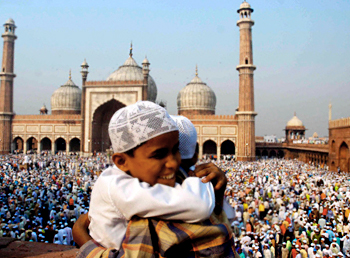 Mosque refers to the Islamic place of worship. The mosque is known as the Masjid in the Arabic Language. Masjid suggests worship, and in Arabic the term literally translates into the place of prostration. Another kind of mosque is the Masjidjami, which means a meeting house. It is the place where the midday prayer on Friday is celebrated. It is a larger place and is attended by more people and also performs more services such as teaching the Holy Quran etc. In their earliest stages, the mosques were open spaces, and evolved significantly over the ages to acquire their distinctive structure. Most of the mosques today have minarets, detailed domes and prayer halls. Even though mosques originated in the Arabian Peninsula, they are now found all over the world wherever there are followers and worshippers. The mosques are the place where the Muslims gather for worship, and they also serve as a kind of social platform from where the dissemination of information, education and the settlement of disputes take place.
Mosque refers to the Islamic place of worship. The mosque is known as the Masjid in the Arabic Language. Masjid suggests worship, and in Arabic the term literally translates into the place of prostration. Another kind of mosque is the Masjidjami, which means a meeting house. It is the place where the midday prayer on Friday is celebrated. It is a larger place and is attended by more people and also performs more services such as teaching the Holy Quran etc. In their earliest stages, the mosques were open spaces, and evolved significantly over the ages to acquire their distinctive structure. Most of the mosques today have minarets, detailed domes and prayer halls. Even though mosques originated in the Arabian Peninsula, they are now found all over the world wherever there are followers and worshippers. The mosques are the place where the Muslims gather for worship, and they also serve as a kind of social platform from where the dissemination of information, education and the settlement of disputes take place.
Traditionally, the mosques have had an important role to play in social life. In the early days the mosque served for all public meetings as well as worship. The Caliph or governor issued declarations of policy there. It seems that meetings for secular purposes were summoned by the call to prayer. Travellers also lodged in the mosque. Teachers, and not only those teachers who taught religion, held their classes there. A well-known man had his special place where he sat against a pillar with a ring of students round him. The recognized witnesses, who served as notaries, sometimes had their seats in the mosque and the judge might hold his court there. The customs have not changed much since earlier times.
Of course the most important function of the mosque, being a place of worship, is to hold and organise prayers. This is done on a regular basis, and special provisions are made during the two recognised Islamic Holidays, Id ul Fitr and Id ul Doha. During this time, large congregational prayers are held in the mosque, and sometimes large public buildings and convention centres are also taken to accommodate the people and hold prayers during this time. Events are also organised in the mosque during Ramzaan, This includes the holding of the Suhoor meals before dawn, Iftaar dinners after sunset as well as holding all night programs. The Muslims also give their Zakat (meaning charity, one of the five pillars of Islam) to the mosque, and some even collect it from here.
A big mosque has several officials, the Muezzin (Muadhdhin) who gives the call to prayer, the preacher (Khatib), and the leader of worship (Imam) who receives salaries. In the Middle Ages these were often scholars of repute. In a small mosque almost anyone may perform these duties. A mosque is often endowed with Waqf property, and it is common to find one surrounded with shops that belong to it, the rents providing for the upkeep. Thus, the mosques form a very important part of Islamic life not only for their religious significance but also due to their social functions.




















